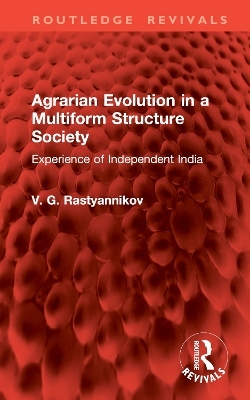
Agrarian Evolution in a Multiform Structure Society
Experience of Independent India
Seiten
2024
Routledge (Verlag)
978-1-032-88853-8 (ISBN)
Routledge (Verlag)
978-1-032-88853-8 (ISBN)
- Noch nicht erschienen (ca. November 2024)
- Versandkostenfrei innerhalb Deutschlands
- Auch auf Rechnung
- Verfügbarkeit in der Filiale vor Ort prüfen
- Artikel merken
In Agrarian Evolution in a Multiform Structure Society (first published in English in 1981) the author analyses the roots of the Indian society and suggests future directions. He argues that India, like many Asian countries, exhibits tendencies peculiar to an economy evolving on the basis of dependent capitalist development.
India in the 1950s and 1960s, with its diversity of economic structures and different levels of regional development, offers a unique opportunity to explore a wide range of agrarian evolution within a multiform society. Basing his study on an extensive survey of the existing literature as well as on fieldwork conducted in India, the author analyses in his book Agrarian Evolution in a Multiform Structure Society (first published in English in 1981) the roots of the Indian society and suggests future directions. He argues that India, like many Asian countries, exhibits tendencies peculiar to an economy evolving on the basis of dependent capitalist development.
The author goes on to show how the state, in seeking to ease the teething problems of development, has assumed a decisive role, expressed in terms of the nationalisation of certain sectors of private exploitative property, and in the supersession of private interests by public ones. The historically inevitable progress of Indian society is therefore a paradoxical one: because its economy exists on the periphery of its system-moulding structure—world capitalism—it has special problems reconciled only by state intervention, this in turn makes the development of a capitalist society impossible. The result is a unique study of a society which has assumed increasing importance in world affairs.
India in the 1950s and 1960s, with its diversity of economic structures and different levels of regional development, offers a unique opportunity to explore a wide range of agrarian evolution within a multiform society. Basing his study on an extensive survey of the existing literature as well as on fieldwork conducted in India, the author analyses in his book Agrarian Evolution in a Multiform Structure Society (first published in English in 1981) the roots of the Indian society and suggests future directions. He argues that India, like many Asian countries, exhibits tendencies peculiar to an economy evolving on the basis of dependent capitalist development.
The author goes on to show how the state, in seeking to ease the teething problems of development, has assumed a decisive role, expressed in terms of the nationalisation of certain sectors of private exploitative property, and in the supersession of private interests by public ones. The historically inevitable progress of Indian society is therefore a paradoxical one: because its economy exists on the periphery of its system-moulding structure—world capitalism—it has special problems reconciled only by state intervention, this in turn makes the development of a capitalist society impossible. The result is a unique study of a society which has assumed increasing importance in world affairs.
V. G. Rastyannikov was a research scholar at the USSR Academy of Sciences.
Introduction Part 1. Subsistence economy and commodity economy relations in the agrarian set-up 1. The Market and Productive Consumption in Agriculture 2. The Market and Personal Consumption in Agriculture 3. The Market and the Producer Part 2: Agrarian Capitalism 4. The Formation of Intermediary Socio-economic Structures and the Emergence of Capitalist Production Relations 5. Capitalism of a Conservative Type 6. State Co-operative Property and the Multiform Structure Rural Economy 7. The Conditions for the Evolution of Small-commodity Production into Capitalist Production 8. Agrarian Capitalism and Urban Capitalism Conclusion
| Erscheint lt. Verlag | 1.11.2024 |
|---|---|
| Reihe/Serie | Routledge Revivals |
| Verlagsort | London |
| Sprache | englisch |
| Maße | 138 x 216 mm |
| Gewicht | 870 g |
| Themenwelt | Geisteswissenschaften ► Geschichte ► Regional- / Ländergeschichte |
| Geschichte ► Teilgebiete der Geschichte ► Wirtschaftsgeschichte | |
| Sozialwissenschaften ► Soziologie ► Spezielle Soziologien | |
| ISBN-10 | 1-032-88853-9 / 1032888539 |
| ISBN-13 | 978-1-032-88853-8 / 9781032888538 |
| Zustand | Neuware |
| Haben Sie eine Frage zum Produkt? |
Mehr entdecken
aus dem Bereich
aus dem Bereich


